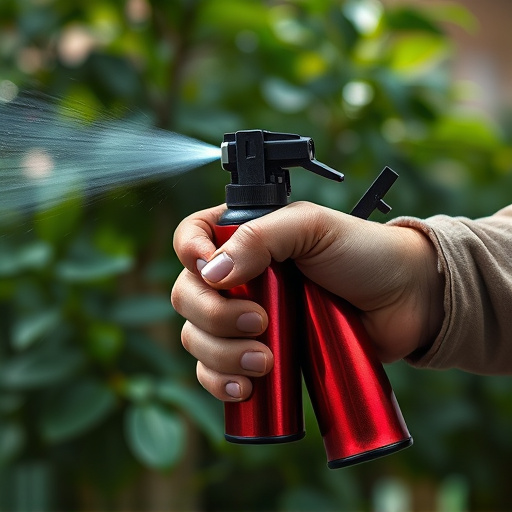Before using pepper spray for civilian protection, understand its risks and proper handling. In case of exposure, immediately rinse affected areas with water, remove contaminated clothing, apply cold compresses, and seek medical attention for severe symptoms. Always consult professionals for tailored guidance on treatment and legal guidelines to avoid penalties.
“Learn how to protect yourself with inflammatory spray for civilian use. This comprehensive guide delves into the intricacies of understanding pepper spray exposure risks, detailing immediate steps to take after contact, and offering effective home remedies for irritation.
We explore legal and safety considerations surrounding its civil use, providing insights on responsible deployment and treatment of pepper spray exposure. Discover essential strategies to manage and mitigate the effects, empowering you with knowledge on how to treat pepper spray exposure effectively.”
- Understanding Pepper Spray Exposure Risks
- Immediate Steps After Pepper Spray Contact
- Home Remedies for Pepper Spray Irritation
- Legal and Safety Considerations for Civil Use
Understanding Pepper Spray Exposure Risks
Understanding Pepper spray exposure risks is paramount before considering it as a civilian protection tool. While effective against potential threats, its use comes with inherent dangers if not handled properly. Pepper spray can cause severe irritation and damage to eyes, respiratory system, and skin. Inhalation of the spray can lead to difficulty breathing, coughing, and even permanent lung damage in extreme cases. Direct contact with the face may result in prolonged pain and discomfort.
Knowing how to treat pepper spray exposure is crucial for mitigating these risks. If exposed, immediately move to an area with fresh air. Rinse eyes thoroughly with water for at least 15 minutes. For eye irritation, apply a cold compress gently. In case of respiratory distress, seek medical attention promptly as it may indicate more severe complications. Remove any contaminated clothing and wash the affected skin areas with mild soap and water.
Immediate Steps After Pepper Spray Contact
In the event of pepper spray exposure, immediate and proper treatment is crucial for mitigating discomfort and preventing potential long-term effects. The first step is to remove any contaminated clothing or footwear, rinsing thoroughly with water to flush out the irritants. Seek a safe, well-ventilated area away from the source of the spray to prevent further inhalation or contact.
For eye exposure, rinse eyes gently but continuously with clean, running water for at least 15 minutes. Do not use water directly from a tap as it may contain chemicals; instead, use a nearby stream, fountain, or other safe water source. If respiratory distress occurs, move to an area with fresh air and apply ice packs to the affected areas to reduce swelling. It’s recommended to consult medical professionals, especially for persistent symptoms, to ensure proper care and guidance tailored to individual needs.
Home Remedies for Pepper Spray Irritation
Pepper spray, while effective as a self-defense tool, can cause discomfort and irritation upon exposure. Fortunately, there are several home remedies that can help alleviate symptoms and provide relief from pepper spray exposure. One common approach is to flush the affected area with copious amounts of water, ensuring every trace of the irritant is removed. This simple step can significantly reduce the severity of symptoms.
Additionally, applying a cold compress or ice pack wrapped in a thin cloth can help numb the skin and reduce swelling. Over-the-counter antihistamines can also be beneficial to combat itching and any potential allergic reactions. Staying hydrated by drinking plenty of water is another effective method, as it helps to dilute any remaining pepper spray residue in the eyes and respiratory system.
Legal and Safety Considerations for Civil Use
When considering inflammatory spray, or pepper spray, for civilian protection, it’s paramount to address the critical legal and safety considerations. The use of such sprays is regulated by local laws, and civilians must operate within these guidelines to ensure their safety and avoid legal repercussions. Misuse or unauthorized possession can result in severe penalties.
Understanding how to treat pepper spray exposure is a key aspect of civilian protection. If exposed, immediate steps should be taken, including thorough washing of the affected area with water and seeking medical attention if symptoms persist or are severe. Proper training and knowledge of safe handling procedures are essential to prevent accidental harm and ensure the spray remains an effective self-defense tool.
Pepper spray, while a valuable tool for personal protection, poses risks that must be understood. Knowing how to treat pepper spray exposure is crucial, especially in civilian contexts. By adhering to immediate steps after contact, utilizing home remedies for irritation, and considering legal and safety aspects, individuals can effectively navigate potential challenges without compromising their well-being. Remember, proper knowledge and precautions are key to ensuring the responsible use of inflammatory sprays.
